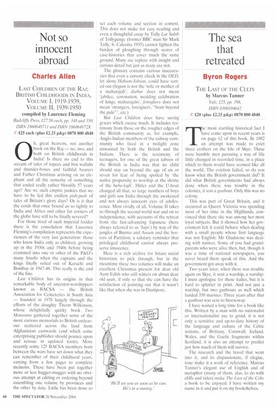Not so innocent abroad
Charles Allen
LAST CHILDREN OF THE RAJ: BRITISH CHILDHOODS IN INDIA, VOLUME I, 1919-1939, VOLUME II, 1939-1950 compiled by Laurence Fleming Radcliffe Press, £27.50 each, pp. 348 and 350, ISBN 1860648711 and ISBN 186064872X £25 each (plus £2.25 p&p) 0870 800 4848 0 h, great heavens, not another book on the Raj — no, two, and both on British childhoods in India! Is there no end to this strcam of tales of topees and box wallahs and thunder-boxes and faithful bearers and Father Christmas arriving on an elephant and all the tamasha of something that ended really rather bloodily 57 years ago? Are we such empire junkies that we have to be fed this endless pish-pash of tales of Britain's glory days? Or is it that the cords that once bound its so tightly to India and Africa and other far corners of the globe have still to be finally severed?
For those tired of such imperial fodder there is the consolation that Laurence Fleming's compilation represents the experiences of the very last generation: those who know India only as children, growing up in the 1930s and 1940s before being crammed into one or other of the P&O's many Straths when the captains and the kings finally sailed out of Karachi and Bombay in 1947-48. This really is the end of the line.
Last Children has its origins in that remarkable body of ancestor-worshippers known as BACSA — the British Association for Cemeteries in South Asia — founded in 1976 largely through the efforts of the doughty Thum Wilkinson, whose delightfully quirky book Two Monsoons gathered together some of the more curious memorials to British endeavour scattered across the land from Afghanistan eastwards (and which some enterprising publisher should pounce upon and reissue in updated form). More recently some 125 BACSA members born between the wars have set down what they can remember of their childhood years, varying from a few pages to complete memoirs. These have been put together more or less hugger-mugger with no obvious attempt at editing or ordering beyond assembling one volume by provinces and the other by date. Little has been done to
set each volume and section in context. This does not make for easy reading and even a thoughtful essay by Tully Lai Sahib of Tollygunge (former BBC man Sir Mark Tully, b. Calcutta 1935) cannot lighten the burden of ploughing through scores of case-histories that cover much the same ground. Many are replete with insight and curious detail but just as many are not.
The glossary contains curious inaccuracies that even a cursory check in the OED, let alone Hobson-Jobson, could have sorted out (begun, is not the 'wife or mother of a maharajah'; durbar does not mean 'jubilee, coronation, wedding celebration of kings, maharajahs', feringhees does not mean 'strangers, foreigners, "from beyond the pale" ', etc.) But Last Children does have saving graces which excuse much. It includes testimony from those on the rougher edges of the British community as, for example, Anglo-Indian members of the railway community who lived in a twilight zone unwanted by both the British and the Indians. There is the testimony of teenagers, for one of the great taboos of the British in India was that no child should stay on beyond the age of six or seven for fear of being spoiled by 'the native propensity to worship at the shrine of the baba-logh'. Hitler and the U-boat changed all that, so large numbers of boys and girls saw India through the awakened and not always innocent eyes of adolescence. Most vividly of all, Volume II takes us through the second world war and on to independence, with accounts of the retreat from the fast-advancing Japanese (here always referred to as 'Japs') by way of the jungles of Burma and Assam and the horrors of Partition; a salutary reminder that privileged childhood cannot always preserve innocence.
Here is a rich archive for future social historians to pick through, but in the meantime these two volumes will make an excellent Christmas present for dear old Aunt Edith who still witters on about dear old ayah, if only so that she can have the satisfaction of pointing out that it wasn't like that when she was in Dustipore.


























































































 Previous page
Previous page